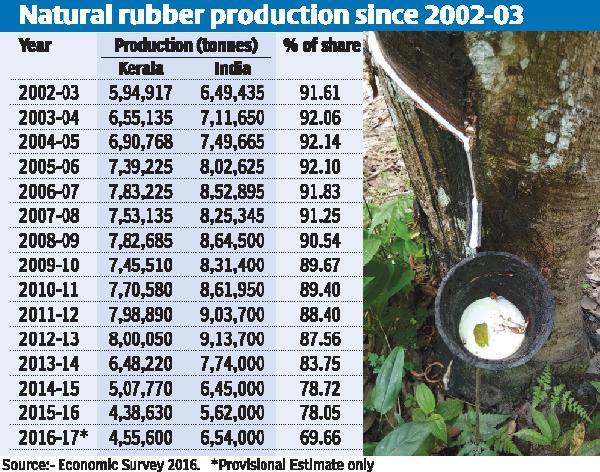KOCHI, OCTOBER 4:

State faces stiff competition from other nations and also within India
The Association of Planters of Kerala (APK) has raised concerns over the State’s declining share in national rubber production during the last decade.
APK, in its annual report, pointed out that the production of natural rubber in the State in FY17 was 4.55 lakh tonnes (lt) against 4.38 lt in FY16, witnessing only a slight increase of 3.87 per cent.
Kerala’s share has now come down to 69.66 per cent of the national production from around 92 per cent a decade ago.
One of the reasons attributed by the planters’ body was the increase in area under cultivation in non-traditional regions such as North Eastern parts and Sindhudurg in Maharashtra and the hilly regions of Gujara.
Climate change has also played a major role in the reduction of total production over the last five years. Despite a regular increase in the area under cultivation, the report said that Kerala’s share has been dwindling over the last decade.
This is an indication that there will be stiff competition for rubber growers in Kerala not only from other rubber-growing countries but also from within the country.
Yield takes a hit
It is pointed out that the yield per hectare in the State was showing a constant downward trend over the last five years due to the fall in prices.
Though the price of the RSS-4 grade improved from the previous years levels of ₹113/kg to around ₹135, it is nowhere near the break-even levels for the grower.
The increase in total production this year was partly due to a moderate increase in prices, coupled with the price stabilisation scheme announced by the Central government.
However, output is far below the potential, and a considerable area remains untapped.
N Dharmaraj, former Upasi president, said that the production is only about 60 per cent of the installed capacity of Kerala’s natural rubber production.
Interference by the government with normal agricultural operations, vital to maintain productivity in rubber plantations, is also causing loss of production and consequent loss of employment.
The report also said that many growers have stopped tapping and if the situation continues, they may stop cultivating rubber and move on to other crops. According to Dharmaraj, the rubber economy is crucially linked to Kerala’s economy, and sustaining profitability in this sector within the framework of national production and international trade should be a key priority for the the government.
Other factors
APK said that imports by the tyre industry even during the peak production months, along with the increase in wages and cost of production, have made rubber lose its attraction.
Added to this, the scarcity of tappers and high level of absenteeism, diversion of farmland to other non-farm activities, and the depleting size of holdings are other factors behind the decline in production.





























